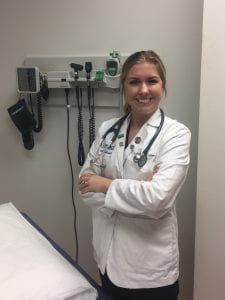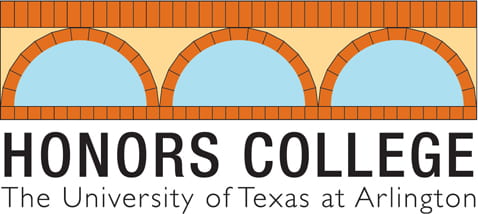 Honors grad Kalee Moore is a medical student at UNT Health Science Center. She graduated with a bachelors of Science in biology with a chemistry minor in 2014.
Honors grad Kalee Moore is a medical student at UNT Health Science Center. She graduated with a bachelors of Science in biology with a chemistry minor in 2014.
Currently in her second year of med school, she’s been hitting the books, taking tests and learning new skills to have what it takes to be a doctor. Now she wants to give students insights from her experience on what to expect once they face that entrance interview.
What’s med school generally like?
We learn our skill sets like procedures, suturing and injections using mannequins in a simulated hospital lab that we have on campus. Then we practice with patients that are paid to come in and act out scenarios. The reality will set in during the second half of seeing and touching the actual patients. Nothing can really 100 percent simulate a real person with a real problem in front of you.
What do you want to specialize in?
In America and most countries worldwide, they accept doctors as MD (medical doctor) or DO (doctor of osteopathy) and so I will be a DO. We learn techniques that are called osteopathic manipulative medicine or OMM for short. That is working with the musculoskeletal system and adjusting the body in a way to facilitate healing itself.
So say, someone falls and they catch themselves with their hands. They could mess up their wrist and their elbows doing that so we have techniques that could manipulate the bones and the wrist that would facilitate the healing factor.
What advice do you have for pre-med students?
Your GPA and MCAT scores help to get you in the door but once you get to the interview and everything they really do a good job of looking at how well rounded you are, what kind of experience you have. They don’t want to hear you want to be a doctor to help people. Even though that was truly my reason. They really want to know deeper, “why?”
What about the MCAT?
The MCAT is not as scary as everybody thinks. Medical school is not as scary as everybody thinks. Just stay calm and if it’S really what you want to do then do whatever you can to do it. A lot of people don’t get in their first try. I think that’s completely normal. The average age of class the first year is about 26 — it’s older than someone who came straight out of college. A lot of people decide to work for a few years. That’s really common.
What’s your ideal job once you graduate from med school?
I’m interested in being either a family physician or an emergency medicine physician in a rural area of Texas. That would be my perfect job, having my own private practice and then having hospital privileges so I can so my own patients in the hospital.
